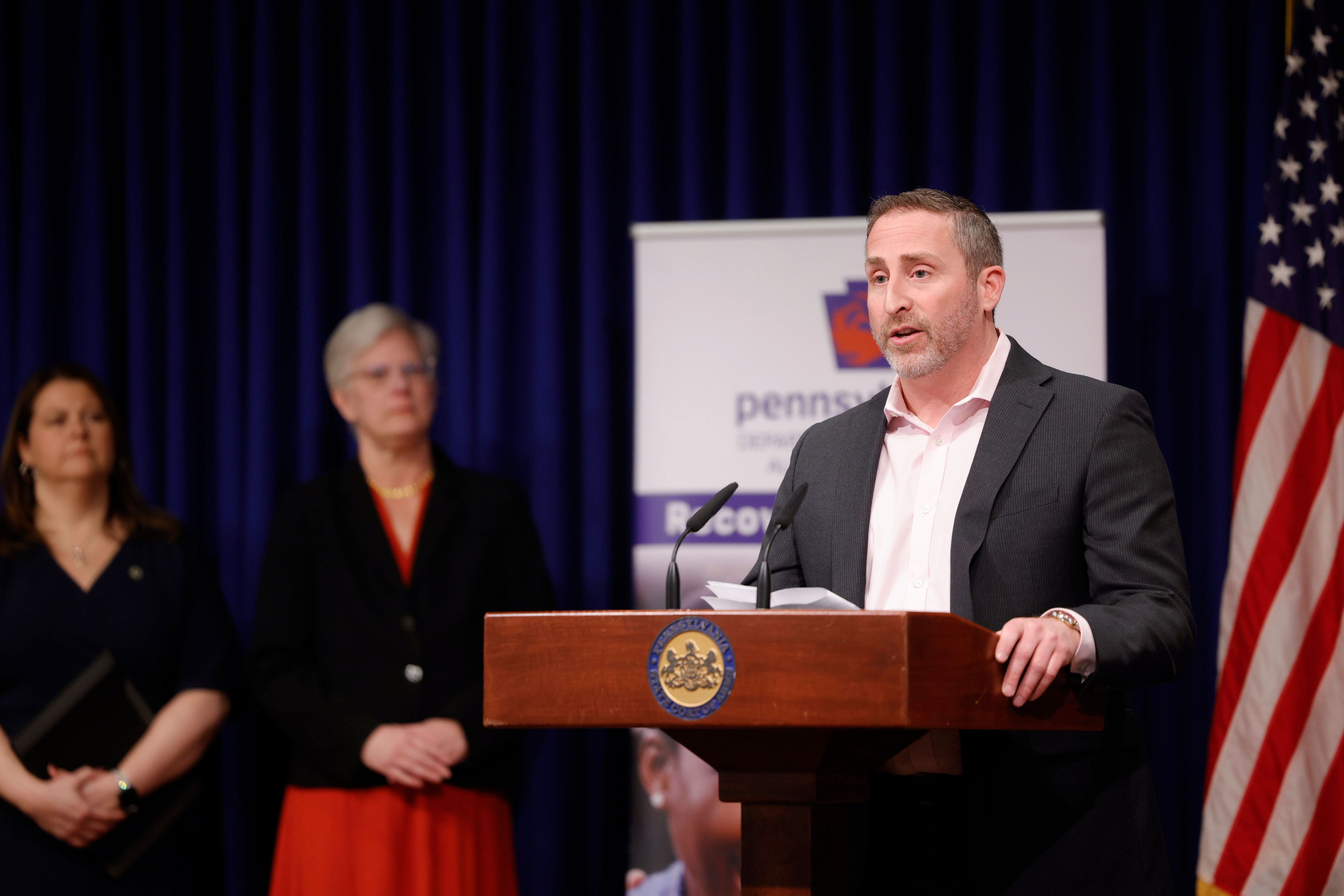Gaming
Watchdogs see uptick in helpline calls as sports and online gambling increase
As new types of wagers continue to rise in popularity, so do concerns about how to help the gamblers who need it most

SPXCHROME / GETTY IMAGES
From sporting events to slots and all wagers in between, there are plenty of options for Pennsylvania gamblers in today’s parlay of gambling paths.
But as sports and online gaming seem to be the industry’s best bet at continuing to increase revenues, the accessibility of the state’s expanded gaming industry – and its potential for increasing problem gambling – is top of mind for watchdogs and legislators monitoring the industry.
The U.S. Supreme Court opened the doors for expanded sports betting and online gambling in 2018, when it deemed the Professional and Amateur Sports Protection Act – which prohibited states from legalizing gambling on professional and collegiate sports – unconstitutional. This ruling came a year after commonwealth lawmakers passed Act 42 of 2017, which amended the state’s Gaming Act to include sports betting, interactive and online gaming, and more.
With the expansion, Nevada was no longer the sole state able to operate single-game wagering, and in the years since, states on the East Coast – including Pennsylvania – have seen sports and online gambling proliferate.
Sports surge
In an interview with City & State, Pennsylvania Gaming Control Board Executive Director Kevin O’Toole said new technologies have “contributed significantly to revenue growth.”
“With just land-based casinos, we had 13 up and running before the gambling expansion bill – and they generated about $3.3 billion annually. After the expansion, it took about a year and a half to two years to bring that revenue figure up over $5 billion, and now it’s getting closer to $6 billion,” O’Toole said.
Post-expansion, Pennsylvania now has more than a dozen sportsbooks operating in the state, including BetMGM, Caesars, ESPN BET, DraftKings and FanDuel.
But while Pennsylvania’s sportsbooks – and the Gaming Control Board’s revenue streams – are seeing the benefits of the growing sports and online gaming industry, the risks associated with problem gambling are becoming more apparent to researchers and watchdog groups.
The Pennsylvania Interactive Gaming Assessment: Online Gambling Report 2023 found that online gambling participation increased to 16% last year after holding steady at 11% in 2021 and 2022. In the same year, the commonwealth’s online gambling revenue increased by more than 27% – totaling $2.1 billion in 2023 and landing the state among the top three online gaming revenue generators in the nation.
“If you turned on a TV or opened up your cell phone and looked at any of the ads on Facebook, the prevalence – and what I would call infiltration into our lives associated with online gambling – has just grown,” Glenn Sterner III, assistant professor of criminal justice at Penn State Abington, the lead author of the report, told City & State. “It makes sense that we saw that increase from 11% to 16% in that third year. We’re curious to see what the numbers will be for this fourth year of the report – there is an early indication that we might even see some additional increases.”
Released in April, the report, developed by Penn State’s Criminal Justice Research Center under contract with the Pennsylvania Department of Drug and Alcohol Programs, summarizes three years of survey data from more than 1,800 individuals from across the commonwealth.

The report found that not only did online gambling and sports betting see an uptick in participation in the commonwealth, but so did the number of reported problems with gambling and the number of calls made to the 1-800-GAMBLER helpline. The number of calls to the helpline regarding online gaming problems increased from 20% in 2021 and 2022 to 34% in 2023 – in 2022-2023, there were a total of 2,834 calls to the helpline, with 974 specifically about online gaming (in 2021-22 and 2020-2021, those numbers were 2,401 and 479, respectively).
Researchers also found that about half of the state’s online gamblers reported problems with gambling; risk factors included increases in gambling frequency, hours, number of formats, spending and motivation to relieve stress.
Gambling generations
Gillian Russell, assistant research professor at Penn State Abington and co-author of the report, said that given the new avenues of access to gaming, there is an increasing concern among the youngest gambling demographic – ages 21 to 30 – that ease of access and lack of education around gambling could lead to further issues.
Within that age group, nearly 50% of gamblers reported being online-exclusive – the highest percentage of any group and more than twice the percentage of the next age group, those aged 31 to 40, which came in at 23%.
“We look at most risk behaviors and it does tend to peak among this younger age group. We’re looking at people with not necessarily fully developed prefrontal cortexes. It’s very easy to kind of fall into these things,” Russell told City & State. “There’s always that enhanced risk. When we move into the digital space, you can start things a lot younger and there’s enhanced anonymity.”
Sterner and Russell said there’s nothing wrong with the growing popularity of sports betting and online gaming among the younger demographics, particularly considering the social and entertainment aspects the games can bring. But at the same time, parents of younger adults should be more aware of what their children are doing and if they’re aware of the risks related to gambling.
“If we’re looking at something that is (in the) behavioral versus substance space, (gambling) is a lot easier to hide,” Russell said. “If I’m using substances, it’s easier for people to see me, catch me and maybe prevent me (from doing it). But if I’m doing it on my phone, am I on Instagram or at a casino? Am I playing a video game or am I on a slot machine? It’s so much easier to hide.”
Josh Ercole, executive director of the Council on Compulsive Gambling of Pennsylvania, is among the leading voices on problem gambling and ways to prevent it.
Ercole told City & State that while ease of access is certainly a contributing factor, the prevalence of sports betting and online gaming isn’t the sole reason the state is seeing an uptick in calls to the helpline. He also said the number of calls coming into the hotline cannot be an indication of problem gambling on its own.
The Department of Drug and Alcohol Programs, which also runs problem gambling-related initiatives, has noted the gambling data is important in identifying where problems may arise and how to best communicate with those impacted by compulsive and problem gambling.
“Being aware of the current online gambling trends in Pennsylvania will help DDAP in its mission to assess and address how gambling behaviors impact compulsive and problem gambling within the commonwealth,” DDAP Secretary Latika Davis-Jones said in a statement. “It will also help us to spread awareness that treatment and resources, like the 1-800-GAMBLER helpline, are there when someone needs help.”
Bet on getting better
Although there are existing programs aimed at helping those with gambling issues, watchdogs and legislators are looking at ways to better target the younger generation and those at risk of problem gambling.
O’Toole noted that the Gaming Control Board maintains a self-exclusion list that allows gamblers to prohibit themselves from gaming in the state for a certain amount of time, as well as self-imposed holding periods and deposit limits.
“We have significant initiatives to provide awareness, education and treatment to compulsive or problem gamblers, or people who believe that they may be approaching those categories. Those initiatives apply to people who are 21 or 22 and they apply to people who are 61 and 62,” O’Toole said. “For the age group 21 and up, we are hopeful that they will look at the various links that are on their screens if they’re playing online because we require the problem gambling logo and we require a link to the self-imposed list.”
Ercole opined that if some of the programs were opt-out instead of opt-in, many gamblers could benefit from the limits.
“If that’s something that can be created in an opt-out format, I feel like that would be a much different situation because people now would be signing up for accounts and have that already in place,” Ercole said.

Some legislators are also looking at ways to create a more protected environment for gamblers, too.
Earlier this year, state Sen. Wayne Fontana introduced Senate Bill 1159, intended to reduce some of the worst financial harm from gambling addiction. It would bar credit cards as the vehicle to deposit funds in accounts with any of the many online Pennsylvania casinos or sportsbooks.
“Online gaming and sports betting is growing exponentially, especially with young adults,” Fontana said in a statement when he introduced the bill. “At the same time, credit card debt is climbing. So we need to make sure the greater access to gambling isn’t leading to burdensome or crippling credit card balances.”
Above all else, Sterner and Russell recommended that information regarding responsible gambling, prevention or treatment availability should be provided through multiple digital media formats such as social media and streaming services.
They both say that prevention, on top of education, is key to ensuring the general public is aware of the gaming industry and the risks associated with gambling.
“We’re developing a great ecosystem of partnerships here to make sure we’re keeping track of what’s going on in Pennsylvania with regards to gambling-related activities so we can hopefully prevent any major issues into the future,” Sterner said. “We have to continue to monitor, assess and develop the evidence base around prevention programming, specifically youth populations, now and into the future.”
